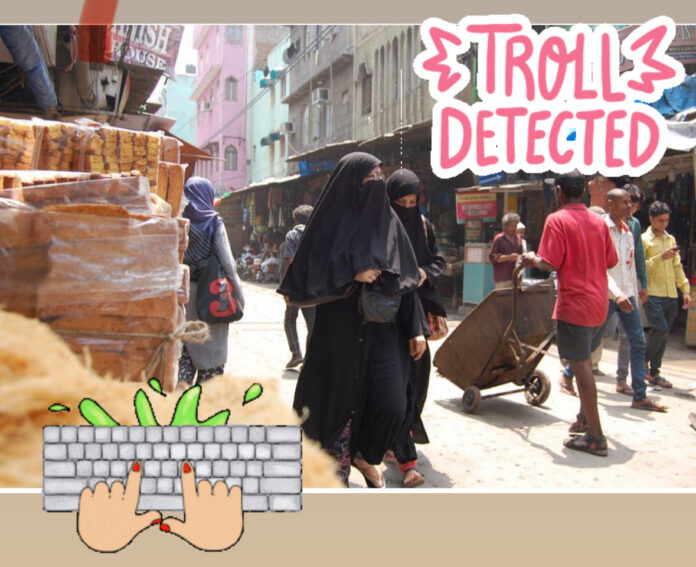Sumaiya Ali, TwoCircles.net
New Delhi: As our lives increasingly shift online, the risks of cybercrimes — such as stalking, trolling, harassment and cyber bullying — have surged. In today’s political climate, minorities, particularly Muslim women, seem to have become frequent targets of these online attacks. This abuse reflects a growing polarisation within the Indian society, raising urgent concerns about individual safety in virtual spaces.
Many believe Islamophobia is no longer confined to office corridors or public gatherings; it has permeated the online realm, where anonymity emboldens perpetrators to act without accountability. Muslim women, often perceived as easy targets, have faced harassment that exploits their religious identity.
In July 2021, photos of over 80 Muslim women, many of whom are journalists or outspoken on social issues, were taken from their social media accounts and featured on a website called ‘Sulli Deals’, where they were subjected to a fake online auction. The term ‘Sulli’ is a derogatory label allegedly wielded by right-wing trolls.
In a similar act of harassment, an app named ‘Bulli Bai’ surfaced, uploading images of over 100 Muslim women and labeling them as ‘Bulli Bai’ (maid) of the day with a price tag. This app was clearly designed as a tool for intimidation and hatred, targeting Muslim women to instill fear. The creators of these hate platforms are alleged to be part of organised hate groups that systematically target individuals who express dissent or support for marginalised communities.
Boom Fact Check highlights an Instagram account, Paltu Paltan, which has amassed over 164,000 followers and specialises in targeting minorities while spreading misinformation.
Muslim men also face harassment in online spaces. Aflah, a 31-year-old media consultant from New Delhi, shared with TwoCircles.net his experiences of being trolled across various platforms like X, Facebook and Instagram. “There is rampant fake news against Muslims and hateful content on social media. Whenever I fact-check those narratives or post anything contrary to their views, I am met with abuse,” he recounts.

He notes that anonymous accounts sharing right-wing content often label him as “anti-national” and exploit his identity as a Muslim to further their attacks.
Afreen Fatima, an activist and one of the victims of the Sulli Deals incident, explains her strategy for managing online abuse: “Responding to trolls won’t change their opinion, so I ignore them as much as I can.”
She mentions that she rarely checks her “others inbox”, where messages from unknown users accumulate and has implemented filters to block certain words in her comments.
“Cyber bullying is an unavoidable part of having a cyber life,” she laments, pointing out that social media platforms like X and Instagram rarely hold these trolls accountable.
She emphasises that when trolls coordinate to target a particular Muslim woman, their aim is to isolate and marginalise her voice, effectively shrinking her digital space.
Fatima urges social media companies to take responsibility for addressing cyber bullying, as they often allow such behavior to persist until victims demand action. “During the Sulli Deals incident, I refused to take a break from social media because that’s exactly what they want — to silence vocal Muslim women,” she adds.
A 29-year-old student, who wishes to remain anonymous, shares that her Muslim identity often invites backlash on social media. “They claim their arguments are logical, but they reek of Islamophobia.”

Despite reporting numerous instances of hate speech on Instagram, she has found that the platform does not take action, raising questions about Meta’s policies and their enforcement.
Uzair Ullah Khan, a New Delhi-based advocate who has handled multiple cases involving online targeting based on Muslim identity, notes a reluctance to pursue such cases legally. This hesitation stems from the slow judicial process and fears of state-sponsored retaliation. “Victims often choose to endure their negative experiences for the sake of mental peace, as legal procedures can become extensions of their suffering,” he explains.
As the number of social media users grows and digital spaces become increasingly public, the question of online safety becomes ever more pressing.
Khan stresses the importance of awareness about rights and the need for consequences for perpetrators of online abuse. When asked about legal protections against online harassment, he says, “There is no specific law addressing these issues, but they can be managed under existing provisions in the penal code and IT laws.”
Irena Akbar, a Lucknow-based entrepreneur and former journalist, is an active user of social media X and has frequently been targeted by trolls. “While social media allows everyone a platform to express themselves, it also has a darker side. This free-for-all environment has been weaponised by political parties and their paid agents — what we call ‘trolls’— to silence dissenting voices, particularly from vulnerable groups like minorities and women,” she reflects.
She advocates for a balance in social media, one that fosters freedom of expression while controlling elements that threaten this very freedom.


